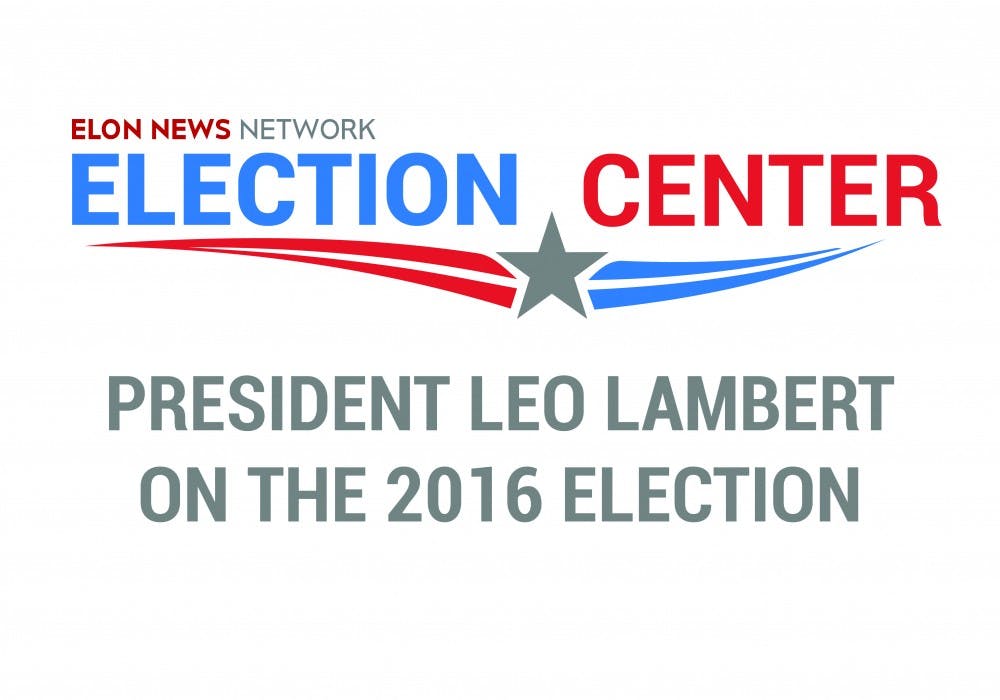This piece appeared in the Nov. 2 Election Special Edition. View more from that edition.
As Elon University President Leo Lambert watched the three presidential debates with his Twitter feed pulled up, he couldn’t believe some of what he read.
This national election with Democrat Hillary Clinton and Republican Donald Trump as presidential nominees is one of the most bizarre he has ever seen.
“I think my jaw was agape a lot of the time,” Lambert said. “It feels to me that people are more guarded in this election than in many that I can remember. […] People are not showing their cards, I think because of the nature of the two leading candidates for the presidency.”
Lambert acknowledged the anger that’s permeated the election, but was encouraged by the positive ways students and faculty have engaged in what’s been an “unusual” election. He includes those students who worked for the Elon Poll and Elon Votes!, which partnered with a number of organizations to host well-attended presidential debate watch parties, and speakers such as Washington Post reporter Bob Woodward—who shared their thoughts on the election.
And, of course, the TurboVote program that helped register students to vote.
“It’s been a good fall on campus trying to create platforms for people to participate in the political process,” Lambert said.
That’s encouraging, Lambert said, considering the divisiveness and polarization of the national election.
He blamed a lot of that on the presidential election and how it has prompted people to put themselves “in an echo chamber” by only listening to and being around people who share similar beliefs.
Lambert said he wishes government leaders would be more willing to work across party lines to find compromises.
“We’ve reached a place of such paralysis and polarization that it would be nice if the president-elect and the Speaker of the House would come together and say, ‘Let’s think of four things we could do to actually accomplish something.’” Lambert said. “That would be astounding. I don’t know if it’s possible that can happen in these times.
“The anger in this election disturbs me. The rhetoric disturbs me. It scares me a little bit, too.”
Those issues have seeped through to North Carolina, too, where the gubernatorial race between incumbent Republican Pat McCrory and Democratic challenger Roy Cooper has attracted national headlines, as has the vital Senate race between Republican Richard Burr and Democrat Deborah Ross — a race that could flip the partisan balance of the Senate.
House Bill 2, otherwise known as the “bathroom bill,” has cost the state millions in potential revenue as companies and organizations have pulled offices, sporting events and more from the state since being passed in March.
Those elections are of dire importance to Lambert, considering Elon draws 80 percent of its students from out-of-state.
“North Carolina has a brand associated with it,” Lambert said. “In many important aspects, I think that brand has been damaged. […] In terms of attracting good students who will want to come from out of state to make this their home, it is a vitally important election.”
Lambert said the political climate and levels of civic engagement on campus have been similar to past elections, with the major difference being the increased access to information channels via the Internet and social media.
He also noted how universities and college campuses play a role in furthering political debates that some might be wary of having. He’s worried about partisan media and the increase of people tuning into sources that only reaffirm their beliefs.
“You have to get out there and listen to alternative points of view, even ones you vehemently disagree with,” Lambert said. “That’s what the university environment is all about.
“If conversations involving important issues in American society, even polarizing issues, can’t be discussed or debated on college campuses, there’s probably nowhere else in American society where that can happen.”
Lambert hopes Elon can build on its efforts to involve students in the community.
“It’s a historically important election,” he said. “I think people are going to be writing books about this election 20 years from now. So many dimensions of it are so unusual.
“The stakes are really high for higher education. […] We all wait on tenterhooks for what’s going to be happening after the election.”


